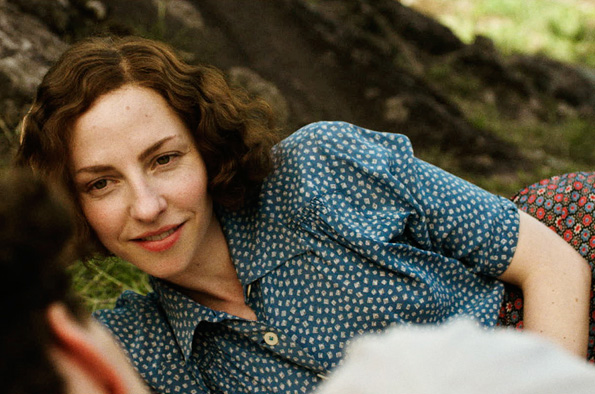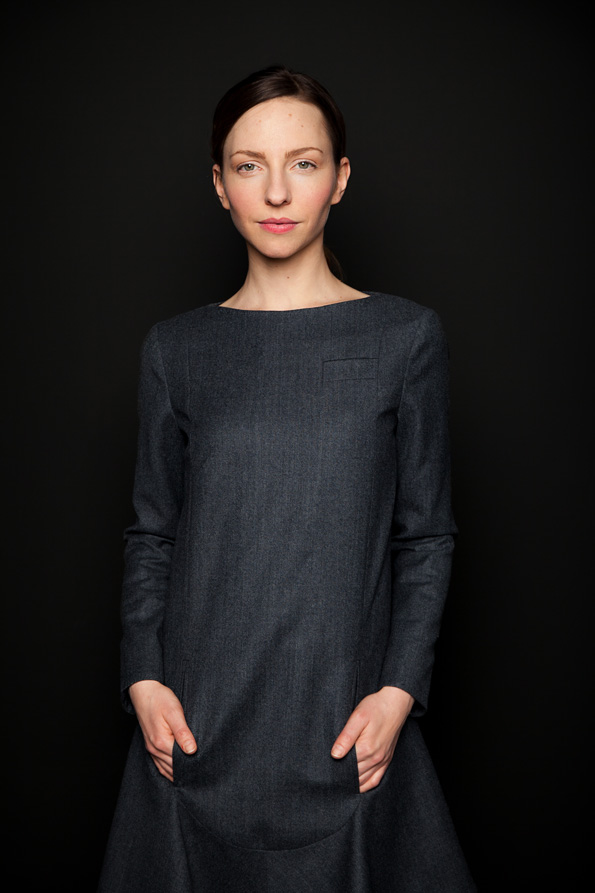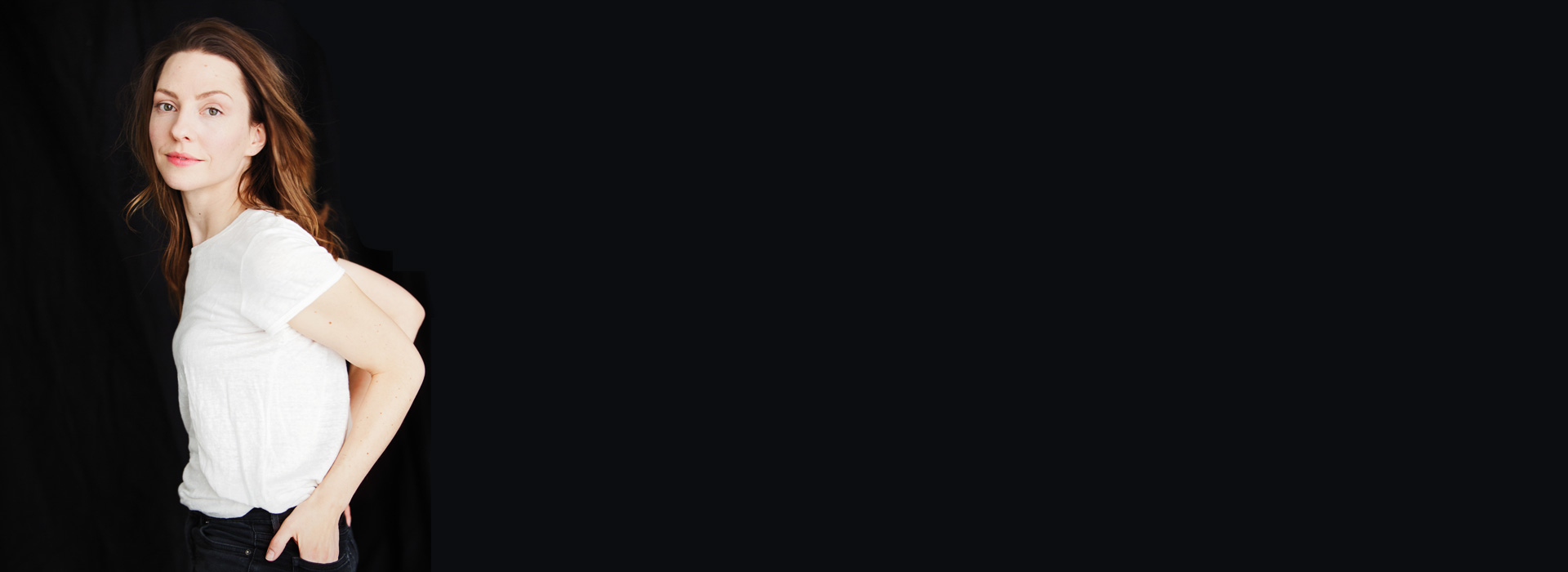A PORTRAIT OF ACTRESS KATHARINA SCHÜTTLER
photo © Alex Malecki“Ilove getting impulses,” says Katharina Schüttler, fresh from New York, where the epic GENERATION WAR won the International Emmy 2014 for Best TV-Movie/Miniseries (she plays the role of Greta). We are in Soho House, it’s lunch time and she orders quinoa with Brussel sprouts. I’m wondering if this is even food, but when she proffers a forkful with “Get over your childhood trauma, you’re going to love it!”... Well, she’s certainly persuasive so okay, I’ll bite and you know what? It’s actually really good! “I had this in New York,” she explains, “they’re fashionable over there. I’m not really vegetarian, I do like eating meat but just wish it wasn’t from animals!”
Was it an impulse when she signed up for the recently released 13 MINUTES (director, Oliver Hirschbiegel), the true story of how Georg Elser came within only a few minutes of killing Hitler and most likely changing the course of history? “It’s quite surprising to talk to an Englishman about this,” Schüttler starts, “because until I got the script I, as a German, had never learned about it. It’s an incredible story of an incredible man, a simple man who tried to do the right thing.”
“It was great writing by Léonie-Claire and Fred Breinersdorfer,” she continues, “I play Elsa, and the character seemed to me like she was growing from the pages! I have a fascination for characters I’ve not played before, who have very special ways of dealing with the world and what happens to them, extreme things and situations, it forces them to act in a special, sometimes even extreme way: a character like a human being!”

Katharina Schüttler in ELSER (photo © Bernd Schuller/Lucky Bird Pictures)
Schüttler likens it to “a cello string that resonates” when she knows the part is for her, and vice versa. “I like things where I think I’m so different but I’d love to find this part in myself, whether I could be or find this person,” she expands. For her, acting is “very much about boiling something down, like in chemistry, to get the elixir, the main information, to find the entrance to the character in that.” Starting to see the world through the character’s eyes, finding the door “opens a whole new world, their behavior begins to make sense although from a first look from outside you would not understand why they behave that way. There is quite a beauty in getting the chance to see the world through different eyes.”
She was born in Cologne, her parents both actors, so following in their footsteps “was the natural thing to do! When I was eleven,” Schüttler narrates, “I was in DIE LOK, the locomotive, a kids’ adventure film when back then there wasn’t yet a market for kids’ films! All we ever got was the annual Disney movie! Anyway, it was about a bunch of kids who want to run away to Siberia with a handcar and stolen lawnmower engine and join the Trans-Siberian Railway!” They make it too, in case you are wondering, but in a much safer way!
After that, Schüttler found “going back to school was strange. There were two totally different worlds, I wanted to stay in the movie one. I was free, with adults, being taken seriously, respected, eye to eye. At school you get the hierarchy, you’re a kid, there’s the teacher. I missed films.” So she turned into the rebel with a cause, fighting authority, challenging... No! In fact “quitting school was never an option so I studied hard to have the time to do films, the school could never say ‘Put school first!’ My grades never went bad!” Damned clever, eh?
It meant she graduated with her diploma and then enrolled in drama school in Hanover, her motivation twofold; it was the front door to working in the theater and Schüttler also wanted to learn the craft to expand her opportunities. These came earlier that she thought when, in 2001, “in my third year I had the chance to play in three productions at the Staatstheater. The third was the premiere of Lolita and I knew I would not go back to drama school. They told me to write my theory paper before the play started and they’d graduate me!”
There follows the kind of anecdote which works in real life but if consigned to the page... It involves an audition, alcohol, Daniel Brühl (with whom she is very good friends), a premiere, a performance, more alcohol and not getting a seat in the train! It resulted in a chance meeting with Belgian theater director Luk Percval who was mounting a play at Berlin’s Schaubühne theater and, sure enough, a few months later, there was Schüttler, premiereing in the legendary Schaubühne, where, three years later in 2005, she achieved her breakthrough with Hedda Gabler. It was to become a role she “played several hundred times and it gave me my first chance in New York! I have to say, it was all such a coincidence and all that time on the train I was more terrified about the after effects from partying with Daniel!”
Here is an interesting fact about quinoa, it sticks to your teeth like it has been weaponized! It does mine, anyway. Katharina Schüttler remains immune as the discussion moves on to the etiquette of noodle slurping in Asia and her favorite films, directors and actors, of which, she says, “it’s so hard to single some out! There’s an ocean of films and people out there and they pop up like waves.” She cites LET THE RIGHT ONE IN and “I recently saw PRISONERS, with Jake Gyllenhaal and loved it. It’s beautifully shot and staged. He is great in DONNIE DARKO as well. Another important one for me is Nicholas Roeg’s OUTBACK, which I saw with my father. That really moved me. I wish I had a second life with time for going to the cinema, theater, museums, reading etc. I find it challenging to get the acting, films and theater together with family life."
Married, one husband (film director Till Franzen), one “little daughter,” Schüttler describes theater as “a bubble, while film work is combined very often with traveling and being away from home. It absorbs you, real life can have hardly any space. It’s very challenging!” Downtime, when she gets it, is beach, the ocean, reading a script, but, she says, “it might be a great idea to find a hobby and actually make time for it!”
Open to all scripts, Schüttler admits she would love “to find a character in crime, in a series, one so dark I could only imagine it would have to be broadcast after ten o’clock, what with it being so dark, so gnarly! So much potential for crime – on the artistic side of course!”
Aware of how coincidence, luck and timing have also played their parts in her career, Schüttler believes people should be encouraged in their endeavors, citing how Germany’s healthy and flourishing film industry grew out of the massive destruction of the Second World War and the need “to think of the individual’s strength and the possibilities that exist, whether to say yes or no, and go for something that is right, just as Georg Elser did. It evokes the question: what does it mean for a person today, how should he or she act when they see something they know is wrong?”
There are things where my conscience shouts, “STOP!!” It’s very powerful stuff, especially the way Oliver Hirschbiegel does it. It is the same with making good films and television, to encourage and be encouraged, to make the right decision.”
Simon Kingsley
-

photo © Alex Malecki
website agent

